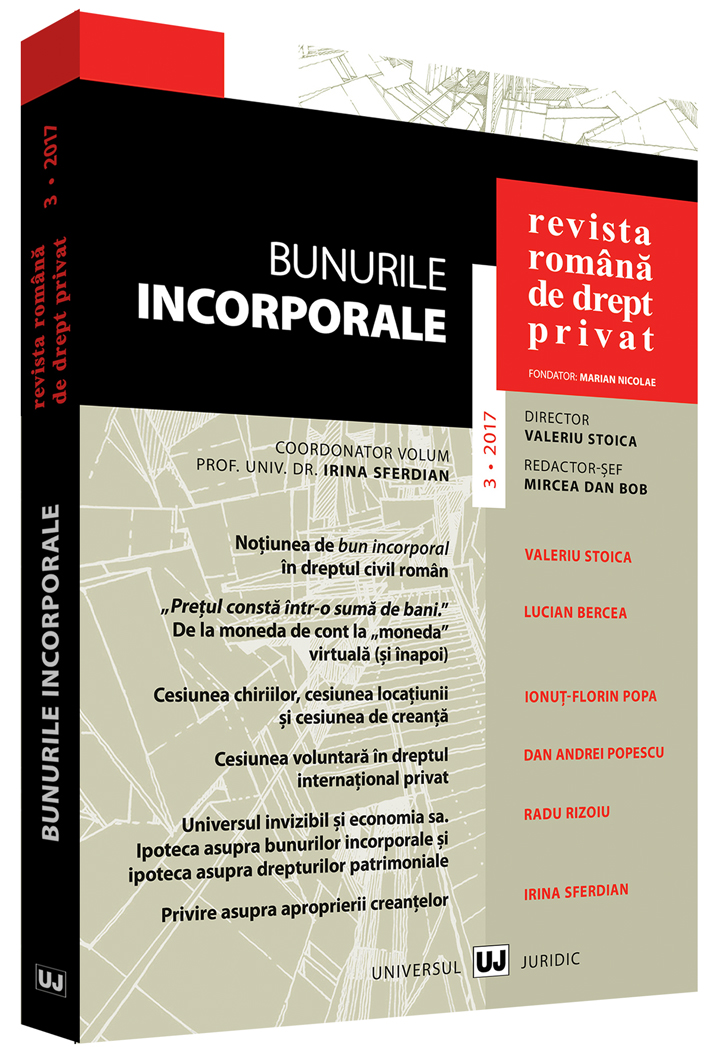Existenţa unui drept de proprietate asupra bunurilor incorporale. Decizia Curţii de Apel din Québec în cauza Anglo Pacific Group c. Ernst & Young
Existence of property rights over incorporeal goods. The decision of the Québec Court of Appeal in Anglo Pacific Group PLC v Ernst & Young.
Author(s): Alin Speriusi-Vlad, Violeta StratanSubject(s): Law, Constitution, Jurisprudence
Published by: Universul Juridic
Keywords: real right; personal right; distinction; creation of a real right; unnamed real right; dismemberment of the right of ownership; incorporeal goods; mortgage over someone else’s goods;
Summary/Abstract: In the decision pronounced in the case Anglo Pacific Group PLC v Ernst & Young, the highest court in Québec, starting from a permanent royalty calculated in cash, analyzes the existence of ownership over the incorporeal assets, establishing the conditions in which the parties create and transfer a real right, and emphasizes the distinction between real and personal rights. The Québec Court of Appeal’s conclusions are essentially the following: 1. A personal right is the right of a person to claim a benefit from another person; even if this right concerns a good, it is exercised against a person, while a real right implies the existence of a direct right over a good. 2. Every right recognized by the special legislation on the exploitation and exploration of the Québec mines in favor of different categories of dealers is a distinct, incorporeal property. 3. The object of ownership can consist of both corporeal and incorporeal goods, insofar as the holder of such a right has all the prerogatives attaching to it (usus, abusus, fructus and accessio). 4. The person who consents to the creation and transfer of a real right over a good in favor of a third party must be the holder of at least a „part” of the abusus. A first application of this case law, analyzed in the authors’ note, is to be found in the field of intellectual property law, whose regulations introduce in the civil circuit the rights over intellectual creations, and not the intellectual creations themselves. Intellectual creations do not consist of the intangible things art. 535 of the New Civil Code refers to, as one might think, for patrimonial rights with respect to them are not consented subsequent to their creation, but at the same time they are created. Article 535 of the New Civil Code only provides that both corporeal and incorporeal values are likely to form the object of patrimonial rights. The existence of a right of ownership or of any other real right is ascertained by the prerogatives to use, enjoy and dispose of goods, described by art. 555 of the New Civil Code, which can be exercised directly over corporeal or incorporeal goods. This is also the criterion according to which the nature of the rights recognized with respect to intellectual creations can be established, since intellectual property rights represent personal rights attached to a propter rem obligation incumbent upon the owner of the material (or electronic) support of the intellectual creation not to replicate it on another material or electronic support, without the consent and/or remuneration of its author.
Journal: Revista Română de Drept Privat
- Issue Year: 2017
- Issue No: 03
- Page Range: 322-342
- Page Count: 21
- Language: Romanian
- Content File-PDF

